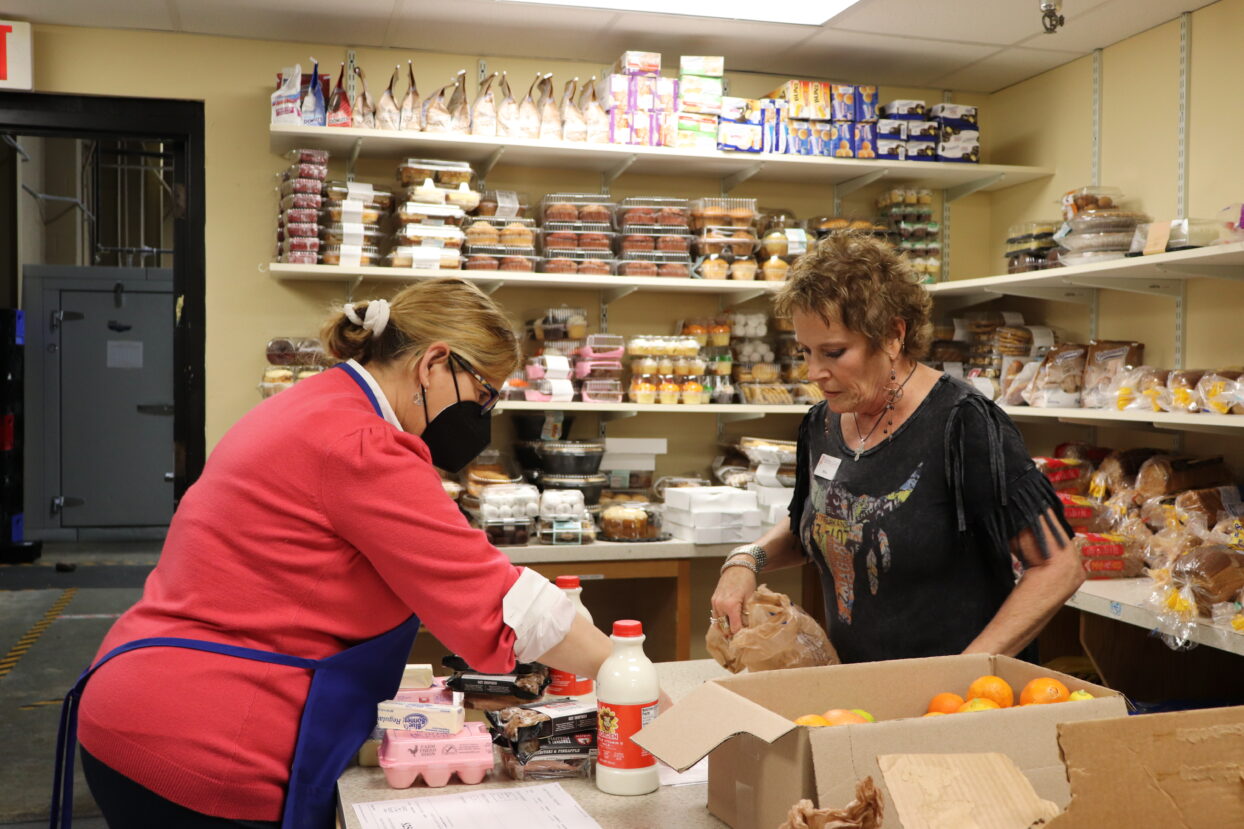Increasing prices at the grocery store mean more people are seeking assistance from the pantries
By Gabrielle Nolan
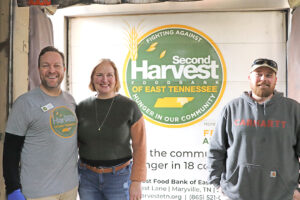
Javan Schiferl (left) of Second Harvest, Susan Unbehaun, executive director of the Ladies of Charity of Knoxville, and Josh Shinpaugh of Second Harvest stand before a truck that just delivered food to the LOCK pantry.
A trip to the grocery store is all it takes to see how inflation is impacting individuals and families in this current economy. Rising food costs limit how far a dollar can go, which means more people are seeking assistance for food.
Several food pantries throughout the diocese have experienced firsthand the increase in food prices and how that affects their increase in clients.
Ladies of Charity, Knoxville
The Ladies of Charity food pantry, located in Knoxville on Baxter Avenue, is open Tuesday through Friday from 9 a.m. to 12:30 p.m.
“Anyone can come in and get help with food,” said Susan Unbehaun, executive director of Ladies of Charity. “We do not exclude anyone from getting help at our pantry.”
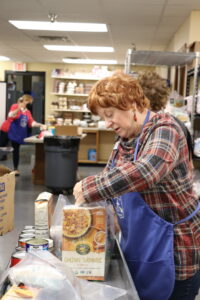
Judy James, a volunteer with the Akima women’s service organization, packages food for Ladies of Charity patrons.
Mostly, the clients are employed people in need of extra food. Six percent of the clients are homeless, while another 20 percent of clients receive government assistance from SNAP.
The Ladies of Charity food pantry saw an increase of clients by 23 percent from 2021 to 2022.
“We’re at 8,100 clients versus 6,600 [in 2021]. That’s distinct clients; that’s one or more times that they come in,” Mrs. Unbehaun said.
Monetary donations to the food pantry have also been affected.
“I would say prior to the fourth quarter (last year) our monetary donations are down, but I’m going to tell you during the fourth quarter, where most of the donations hit with food donations and food drives and things, have really gone over the top this year. I’m going to say that we have had such good support on those items.
“I looked in our current year over last year’s food costs, and it’s up 77 percent. We haven’t changed our food package. We pre-pack our food, and then we use food rescue and donations in addition to what we pack normally,” Mrs. Unbehaun explained.
“Some of the things that we’ve had a harder time filling is the dairy products and the butter and eggs; those kind of come and go a little more infrequently than we’d like to have,” she continued.
However, consistent food donations to the pantry have helped retain the service that people have come to know at Ladies of Charity.
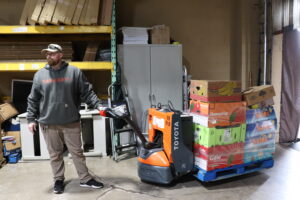
Josh Shinpaugh of Second Harvest Food Bank delivers pallets of food to the Ladies of Charity food pantry.
“Our cost per client has actually dropped $1.39 due to our food donations. So even though the food costs went up that much this year, our cost per person actually dropped with very little change in service,” Mrs. Unbehaun said.
St. Anthony Bread, Mountain City
St. Anthony of Padua Parish in Mountain City opens its food pantry, St. Anthony Bread, the first and third Thursdays of every month.
The food pantry, which is older than the church building, has existed for more than 25 years and serves anyone in need in Johnson County.
“It really is something that the community relies on,” said Leni Smith, director of St. Anthony Bread. “We’re the same hours and days for years, so the community is very reliant on it, and we are so happy to be able to do it, have the resources to be able to offer this to people.”
Ms. Smith noted that the food pantry has seen a 41 percent increase in clients over the past year.
“We’re averaging right now about 650 families/households a month, and so on a monthly basis that’s about 1,450 individuals that comprise those families,” she said. “Some were helped many times, some were only helped once or twice.”
In 2022, the food pantry served 2,749 individuals, as compared to 1,934 individuals in 2021.
The number of households served steadily increased throughout 2022, with 474 households served in January and 635 served in December. Last year’s high was 720 households served in November.
“It’s a lot of families; it’s a lot of people,” Ms. Smith said. “There’s a lot of need in Johnson County; we’re one of the poorer counties in Tennessee.”
The need has increased because of inflation and rising food costs, which affects the food pantry in a couple of different ways.
“If you look at it from just the food pantry standpoint, we are affected by rising costs and groceries and other items, just like everyone else is,” Ms. Smith said.
“And then there’s the end where some of our families who were just managing to get along before the prices were so skyrocketed in the grocery store,” she continued. “We have more families that need us now. They can’t make their money go as far as it used to, so they are needing to come to us for some help.”
The St. Anthony Bread food pantry purchases around 95 percent of its food from Second Harvest Food Bank of East Tennessee, which has a Feeding America facility located in Kingsport that provides food for pantries in eight counties in northeastern Tennessee.
“We are able to purchase [food] through individual monetary donations and grants,” Ms. Smith noted.
“It is a lot of work, but we have a lot of absolutely fantastic, committed volunteers,” she continued. “It is totally 100 percent volunteer-based, and the people work hundreds of hours each month to get all of it ready because when you have 400 cars coming through your parking lot in a five-hour period, you’ve got to be ready.”
In case inflation continues, St. Anthony Bread does have a contingency plan that would provide solutions for rising food costs and assisting more families in need.
“Some of those things include giving out less food or limiting the number of people and not accepting new clients,” Ms. Smith said. “We have not done any of these things yet; we don’t want to do them, but they are things that we might have to do.”
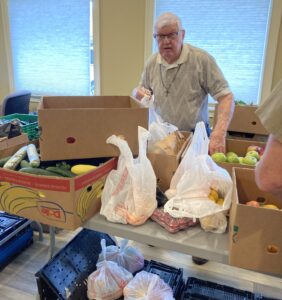
Francis Galvani is a delivery driver for the Peavine Care Center food pantry. Each week, he delivers food to clients who are elderly, handicapped, or do not have transportation to the pantry.
The food pantry currently does not have fundraisers, so beginning active fundraising is another option, as well as applying for more grants.
“All of these things are last-resort kind of things,” Ms. Smith said.
Peavine Care Center, Fairfield Glade
While St. Francis of Assisi Parish in Fairfield Glade supports three food pantries in Cumberland County, its primary food pantry is Peavine Care Center located in the Glade.
“We are more intimately involved with that pantry. In fact, our board, which is five people—four of them are from St. Francis. We do food distributions once a week as well as special events that we’ll do with Peavine Care Center,” said Mary Lampugnano, who serves as assistant director for the food pantry, which is open for food distribution from 10 a.m. to noon Wednesdays.
A partner of Second Harvest Food Bank, Peavine Care Center receives a delivery once a week from the food rescue program, where the free food is collected from overflow at grocery stores. The food pantry also purchases an order once a month from Second Harvest, where non-perishable foods are delivered for the month.
In addition, St. Francis of Assisi Parish continually has food baskets throughout the church, where parishioners can donate food regularly.
“We have a plethora of donations. And I have to tell you, the donations from St. Francis parishioners directly have been consistent,” Ms. Lampugnano said.
“Food inflation is horrible,” Ms. Lampugnano said. “Our costs with Second Harvest, our food costs tripled since last year for two reasons. One, the prices went up obviously but also our client load. We’re up by 30 percent over last year.”
Ms. Lampugnano noted that they are “seeing a dramatic increase” in clients at Peavine, with new averages at approximately 130 people daily.
“Last year we averaged about 90-95 (per day), and two years before that we were in the 80s. It just makes sense, with inflation being so high; people are relying on us.”
About 90 percent of their clients receive food stamps.
“We hope people are in need, but the need is self-reported,” Ms. Lampugnano explained. “The question that I ask people when they come in and they say, I need food assistance, my question is, are you hungry? If the answer is yes, we serve them.”
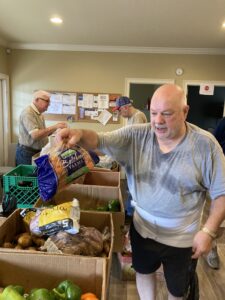
Rob Arcaro (front right), Francis Galvani (left), and Luke Hebert (back right) are St. Francis of Assisi-Fairfield Glade parishioners and longtime volunteers at the Peavine Care Center pantry. Mr. Hebert orders all of the food the pantry purchases from Second Harvest and also volunteers at the pantry’s Backpack Program, which distributes food to children on Fridays for weekend consumption. Mr. Arcaro is a Peavine Care Center board member who heads up the “Monday Crew,” the volunteers who sort through and repackage food on Mondays for distribution on Wednesdays.
Because of inflation, Peavine no longer provides a care closet of non-food items, such as toilet paper, paper towels, wipes, shampoo, soap, and toothpaste.
“We have stopped doing that now,” Ms. Lampugnano said. “I do run a drive about twice a year at church asking for those kinds of items, so as we get them and people request them, we’ll distribute them, but we used to purchase them . . . We’re concentrating only on food, but I would like very much to continue that (care closet) because that’s a great need.”
“Anybody on food stamps, they can’t buy the non-food items,” Ms. Lampugnano continued. “We all need toothpaste, and we all need toilet paper.”
A unique aspect of the Peavine Care Center is that food can be delivered to clients’ homes, such as those who are handicapped or do not have transportation.
“More people are asking for deliveries because they’re having car issues . . . We’re kind of a rural community,” Ms. Lampugnano explained. “People are traveling quite a distance, 10-plus miles to get to us, and that’s been difficult. We’re getting more requests for deliveries as well as, again, every week we see a few more clients. As the word gets out, people want to come to us, and we turn no one away.”
Good Shepherd Center, Madisonville
“The Monroe County Catholic Community, the predecessor of St. Joseph the Worker Church, was one of four churches that established the Good Shepherd Center in 1986,” said Father Julius Abuh, pastor at St. Joseph the Worker. “Our parish supports Good Shepherd Center with volunteers as board members, pantry workers, and donators of food and monetary donations.”
The Good Shepherd Center, which is the sole food bank in Monroe County, is open Monday through Thursday from 9 a.m. to 12:15 p.m. Registered clients receive services for food assistance.
Father Abuh said the need for assistance in Monroe County is great, and that the capacity of the Good Shepherd Center is being stretched.
“Monroe County is one of the poorest communities in Tennessee,” he said. “The economic conditions currently in the county are taking a toll increasingly on the poor and at-risk individuals and families. Higher costs for food, rent, gas, and utilities result in more families and individuals seeking help.”
Thirty-five percent of food donations come from the four founding churches, while farmer’s markets and grocery stores also donate food. Additionally, the food pantry purchases items from Second Harvest. From the community, local individuals donate items and money regularly.
The Good Shepherd Center has seen a 30 percent decrease in food donations from individuals and companies.
“As a result of higher demand and less donations from government agencies, corporations, and individuals contributing fewer items, the Good Shepherd Center is tapping into its reserve funds to meet the greater demand. They continued to ask for additional food and money donations,” Father Abuh explained.
However, food and monetary donations from local churches have increased.
The close relationship between St. Joseph the Worker Parish and the Good Shepherd Center ensures that help will continue to be provided.
“Over 70 percent of the volunteers at the Good Shepherd Center are from St. Joseph the Worker Catholic Church,” Father Abuh noted. “Aside from the personnel working at the center, we take up monetary collections every Sunday, side by side with our regular Sunday offering for the Good Shepherd Center. We send one check to the center at the beginning of every month.”
The parish also posts in the bulletin what items the food pantry is in most need of and conducts a food drive on the second weekend of the month.
“Our common goal is to support our neighbors who are experiencing difficult times,” Father Abuh said.

